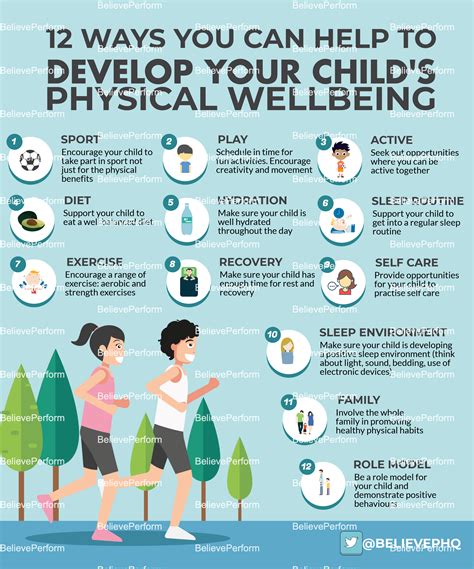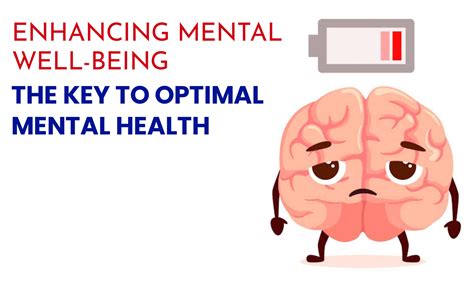Engaging in consistent physical activity is fundamental to promoting an optimal state of well-being and maintaining a healthy lifestyle. By incorporating regular exercise into our daily routines, we can unlock a multitude of advantages that greatly contribute to enhancing our physical, mental, and emotional health.
Promoting Physical Fitness: Regular physical activity serves as a powerful catalyst in improving and maintaining our overall physical fitness. Engaging in activities that stimulate the body, such as aerobic exercises and strength training, helps to build endurance, increase muscle strength, and enhance flexibility. These physical enhancements pave the way for a more active and fulfilling life, enabling individuals to take on daily activities with greater ease and vitality.
Boosting Mental Acuity: Exercise has proven to be an invaluable tool in sharpening cognitive function and promoting mental acuity. Studies have shown that engaging in regular physical activity stimulates brain activity, leading to enhanced memory and heightened concentration. Additionally, the release of endorphins during exercise elevates mood, reduces stress, and alleviates symptoms of anxiety and depression, ultimately fostering improved mental well-being.
Strengthening the Immune System: Incorporating regular exercise into our lives plays a crucial role in fortifying our immune system. Physical activity increases blood circulation and improves the oxygenation of cells, enhancing their ability to fight off harmful bacteria and viruses. A strong immune system not only helps to prevent illness but also accelerates recovery from diseases, enabling individuals to maintain optimal health and vitality.
Preventing Chronic Diseases: Regular exercise serves as a powerful preventative measure against a myriad of chronic diseases. Engaging in physical activity helps to regulate blood pressure, reduce the risk of heart disease and stroke, and maintain healthy cholesterol levels. Additionally, exercising regularly aids in the prevention of conditions such as type 2 diabetes, certain types of cancer, and osteoporosis. By incorporating exercise into our lifestyle, we take proactive steps in safeguarding our long-term health and well-being.
To fully reap the countless benefits that regular exercise offers, it is crucial to create a well-rounded fitness routine that incorporates a variety of activities that challenge our bodies and minds. Ignite your journey towards enhanced health and overall well-being by making regular physical activity an integral part of your daily life.
The Power of Consistent Physical Activity: Enhancing Your Wellbeing

Regular physical activity holds remarkable potential for improving your overall health and promoting a state of complete wellness. Engaging in consistent exercise has the ability to bring about a myriad of benefits encompassing not only physical health but also mental and emotional wellbeing.
By incorporating regular physical activity into your routine, you can experience a significant boost in your physical fitness levels, which leads to enhanced strength, flexibility, and endurance. Additionally, consistent exercise aids in maintaining a healthy weight, reducing the risk of chronic diseases, and improving cardiovascular health. It also contributes to the development of strong bones and muscles, thereby increasing overall functional abilities.
Moreover, engaging in regular exercise has a profound impact on mental and emotional wellbeing. Physical activity stimulates the release of endorphins, often referred to as "feel-good" hormones, which can help alleviate stress, anxiety, and depression. It promotes better sleep patterns, enhances cognitive function, and increases feelings of happiness and self-confidence. Exercise also provides an opportunity for social interaction, fostering connections with others and reducing feelings of loneliness.
Consistency is key when it comes to experiencing the full range of benefits that exercise offers. By incorporating regular physical activity into your lifestyle, you can tap into the transformative power it holds for your overall health and wellbeing. Whether it's engaging in recreational sports, going for a jog, or participating in a fitness class, finding enjoyable and sustainable ways to stay active can bring about a multitude of positive effects on your mind, body, and spirit.
Improved Physical Fitness and Stamina
Enhancing your overall physical condition and endurance through regular physical activity brings numerous benefits to your body and well-being.
Engaging in regular exercise aids in the advancement of your physical fitness and stamina. It enables you to push your limits and expand your capabilities, resulting in increased strength, flexibility, and cardiovascular endurance. By consistently challenging and stimulating your body, you can witness noticeable improvements in your athletic performance and physical capabilities.
Regular exercise not only increases your physical prowess, but it also enhances your stamina. As you incorporate physical activity into your routine, your body becomes accustomed to continuous movement, leading to an improved ability to sustain physical exertion for longer durations. By gradually increasing the intensity and duration of your workouts, you'll gradually notice an increase in your stamina levels, allowing you to engage in more demanding activities without feeling overtired or fatigued.
In addition to the physical benefits, improved physical fitness and stamina can have a significant impact on your daily life. By having a greater level of fitness and stamina, you'll find it easier to perform daily tasks and activities, such as carrying heavy loads, climbing stairs, or participating in recreational sports and activities. This increased physical efficiency not only makes daily tasks more manageable but also enhances your overall quality of life.
In conclusion, regular exercise plays a crucial role in improving your physical fitness and stamina. By incorporating physical activity into your routine, you'll be able to enhance your physical capabilities, increase your endurance, and enjoy a higher level of fitness and well-being.
Enhanced Mental Well-being and Cognitive Function

Maintaining a regular exercise routine offers numerous benefits beyond physical health. Engaging in regular physical activity can significantly improve overall mental well-being and cognitive function.
Regular exercise has been proven to positively impact mood and reduce symptoms of anxiety and depression. Physical activity releases endorphins, which are commonly referred to as "feel-good" hormones. These endorphins promote a sense of well-being and can act as natural mood enhancers. Additionally, regular exercise can help reduce stress levels, improve sleep quality, and enhance self-confidence, leading to improved mental health and a greater sense of happiness and fulfillment.
Furthermore, engaging in regular exercise can have a positive impact on cognitive function. Studies have shown that physical activity increases blood flow to the brain, which can enhance cognitive abilities such as attention, memory, and problem-solving skills. Regular exercise has also been linked to a reduced risk of cognitive decline and neurodegenerative diseases, such as Alzheimer's disease. By promoting brain health and cognitive function, regular exercise can improve overall mental performance and maintain cognitive abilities as individuals age.
Incorporating exercise into one's lifestyle can have profound effects on mental well-being and cognitive function. By prioritizing regular physical activity, individuals can experience improved mood, reduced stress levels, enhanced cognitive abilities, and a decreased risk of cognitive decline. Emphasizing the importance of exercise for mental health and cognitive function can motivate individuals to make physical activity a regular part of their lives, leading to a healthier and more fulfilling overall well-being.
Decreased Risk of Chronic Diseases
Regular physical activity can contribute significantly to reducing the chances of developing chronic conditions over time. Engaging in frequent exercise can help prevent various long-term illnesses and improve overall health and well-being.
- Lowered risk of cardiovascular disorders: Regular exercise plays a vital role in maintaining a healthy heart and reducing the chances of cardiovascular diseases, such as heart attacks, high blood pressure, and strokes.
- Reduced risk of type 2 diabetes: Incorporating physical activity into daily routines can help regulate blood sugar levels, improve insulin sensitivity, and decrease the likelihood of developing type 2 diabetes.
- Decreased risk of certain cancers: Engaging in regular exercise can mitigate the risk of certain types of cancers, including breast, colon, lung, and prostate cancer.
- Improved respiratory health: Regular physical activity strengthens the respiratory system, reducing the risk of chronic respiratory diseases like asthma and chronic obstructive pulmonary disease (COPD).
- Enhanced bone density and reduced risk of osteoporosis: Weight-bearing exercises, such as walking or weightlifting, stimulate bone growth and increase bone density, decreasing the risk of osteoporosis and fractures.
- Lowered risk of obesity: Regular exercise contributes to weight management and helps prevent obesity, a major risk factor for numerous chronic diseases.
By incorporating regular exercise into one's daily routine, individuals can significantly decrease their vulnerability to chronic diseases, improving their overall health and quality of life.
Better Sleep Quality and Increased Energy Levels

Quality sleep and high energy levels are two significant benefits of incorporating regular physical activity into your lifestyle.
Engaging in exercise on a consistent basis can improve the overall quality of your sleep. When you regularly participate in physical activities, your body experiences a natural release of endorphins, which are known as "feel-good" chemicals. These endorphins help reduce stress and anxiety, allowing for a better relaxation and aiding in falling asleep faster.
In addition, regular exercise can increase energy levels throughout the day. Physical activity stimulates blood circulation, delivering oxygen and nutrients to your muscles and organs, resulting in a boost of vitality. When you engage in exercise, your body becomes more efficient in utilizing oxygen, making everyday tasks feel easier and providing you with more energy to accomplish them.
Moreover, participating in regular exercise can also enhance the quality and duration of your sleep. As you consistently engage in physical activity, your body temperature rises during exercise and then falls afterward, promoting a more restful and deeper sleep. A good night's sleep is essential for maintaining optimal cognitive function, memory, and overall well-being.
By incorporating regular exercise into your routine, you can experience the dual benefits of better sleep quality and increased energy levels. These advantages not only contribute to your overall health and wellness but also enhance your productivity and mood throughout the day.
FAQ
How does regular exercise benefit overall health and wellness?
Regular exercise offers numerous advantages for overall health and wellness. Firstly, it helps to strengthen and tone muscles, improving physical strength. Secondly, exercise increases cardiovascular health, reducing the risk of heart diseases. Additionally, exercise aids in weight management by burning calories and promoting a healthy metabolism. Moreover, regular physical activity improves mental health by reducing stress, anxiety, and depression. It also boosts self-esteem and promotes better sleep patterns. Overall, regular exercise plays a vital role in maintaining a healthy and balanced lifestyle.
What are some specific benefits of regular exercise?
Regular exercise has a multitude of specific benefits. It enhances the immune system, making individuals less prone to diseases and infections. It also helps to improve flexibility and balance, reducing the risk of falls and injuries, especially for older adults. Regular exercise promotes better digestion and gut health. It can also lower blood pressure and cholesterol levels, reducing the risk of hypertension and cardiovascular diseases. Additionally, exercise increases bone density, reducing the risk of osteoporosis. These specific benefits emphasize the importance of incorporating regular physical activity into daily routines.
How often should one exercise to reap the benefits?
The frequency of exercise depends on individual goals and fitness levels. Generally, adults should aim for at least 150 minutes of moderate aerobic activity or 75 minutes of vigorous aerobic activity per week, along with strength training exercises twice a week. However, individuals should consult with a healthcare professional or a certified trainer to determine a personalized exercise plan that suits their needs. It is essential to start gradually and gradually increase the intensity and duration of workouts to prevent injuries and maximize benefits.
Can regular exercise help in weight loss?
Yes, regular exercise can aid in weight loss. Engaging in physical activities helps burn calories and increase metabolism, resulting in weight loss or weight maintenance. Combining exercise with a healthy and balanced diet is crucial for achieving and maintaining weight loss goals. It is important to note that the types and intensity of exercises may vary depending on individual preferences and physical abilities.
What are some tips for staying motivated to exercise regularly?
Staying motivated to exercise regularly can be challenging, but there are several tips to help maintain motivation. Firstly, setting realistic and achievable goals can provide a sense of accomplishment and keep individuals motivated. It can be helpful to find an exercise routine that is enjoyable and suits personal preferences, whether it's dancing, swimming, or playing a sport. Exercise can also be more enjoyable when done with a friend or joining group fitness classes. Tracking progress, celebrating milestones, and rewarding oneself can also serve as motivation. Overall, finding the right balance of enjoyable activities and personal incentives can help individuals stay motivated to exercise regularly.
What are the key advantages of regular exercise for overall health and wellness?
Regular exercise has numerous benefits for a person's health and wellness. Firstly, it helps to maintain a healthy weight by burning calories and increasing metabolism. Secondly, exercise strengthens the heart and improves cardiovascular health, reducing the risk of heart disease. Thirdly, physical activity promotes good mental health by reducing symptoms of depression and anxiety and enhancing mood. Furthermore, regular exercise boosts energy levels, improves sleep quality, and enhances overall productivity throughout the day. Lastly, it helps to strengthen bones and muscles, improving posture, balance, and reducing the risk of falls and injuries.
How much exercise should one engage in for optimal health and wellness?
The amount of exercise needed for optimal health and wellness varies based on individual requirements and goals. For adults, it is recommended to engage in at least 150 minutes of moderate-intensity aerobic activity or 75 minutes of vigorous-intensity aerobic activity each week. This can be further divided into 30 minutes of exercise on most days of the week. Additionally, it is beneficial to engage in strength training exercises at least two days a week, targeting all major muscle groups. It's important to note that even small amounts of physical activity can bring health benefits, and it's always advisable to consult with a healthcare professional before starting an exercise routine.



